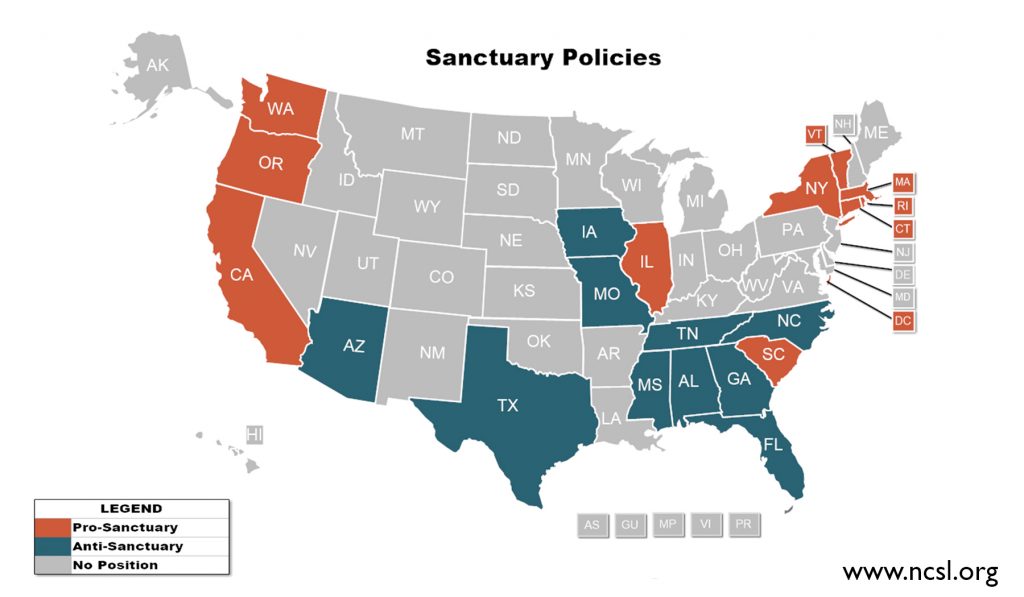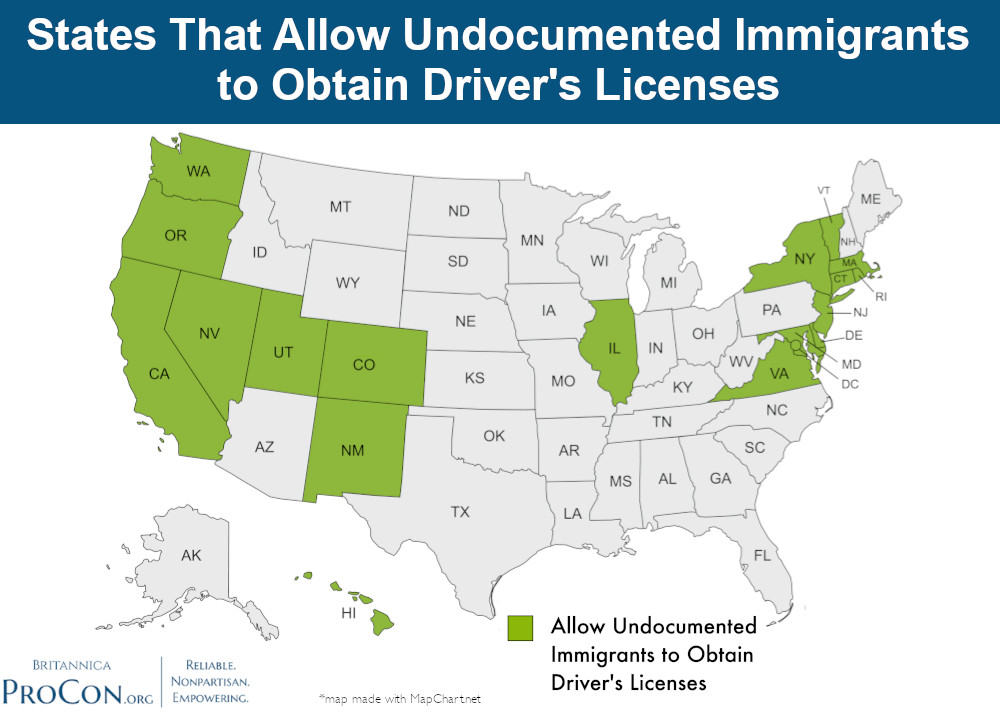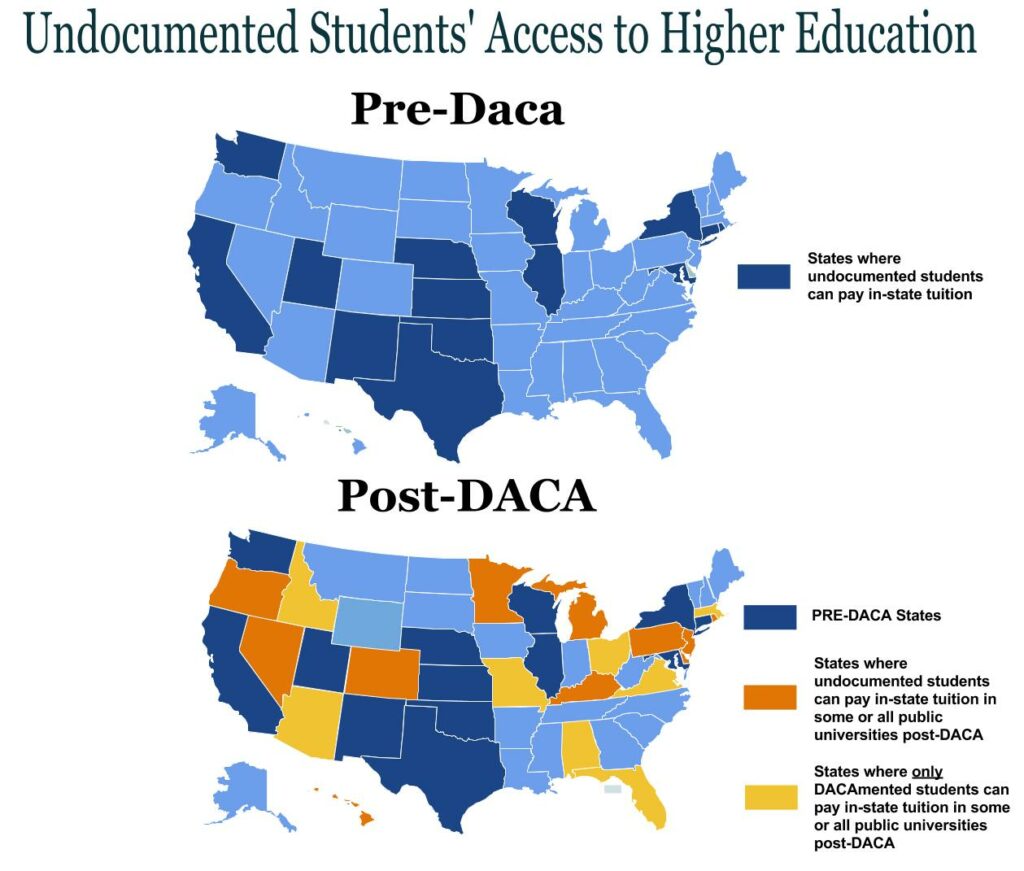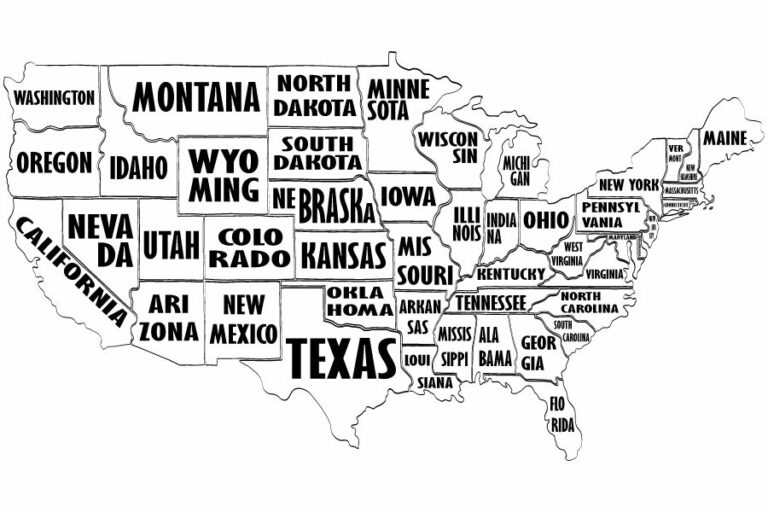How Many Sanctuary States & Cities Are There in USA?
If you’re dreaming of a life in the U.S. or searching for safer shores, you may have come across the term ‘sanctuary state’. This isn’t just a catchy phrase – it could be a lifeline for many immigrants hoping to find a welcoming home in America.
Currently, 11 states and Washington D.C. are considered “sanctuary states”.
Sanctuary policies are basically rules some cities, counties, or even whole states adopt to limit how much they help out with federal immigration matters. While they’re not forced to chip in with federal immigration work, they can’t actively block it either because of certain federal laws and parts of the U.S. Constitution.
Sanctuary states serve as more than just geographical entities; they’re a testament to the values of acceptance and protection.
Our goal with this article is to provide you all the information available about undocumented immigration policies in sanctuary states, cities, and counties in the USA.
Disclaimer: The information on this blog is for general awareness only and reflects data up to our last update. Laws and policies may change, and while we aim for accuracy, we can’t guarantee its current completeness. This isn’t legal advice; always consult a qualified attorney for specific legal needs. We’re not responsible for actions taken based on this content.
What States Are Sanctuary States?
Right now, 11 states and the District of Columbia call themselves “sanctuaries”:
- California
- Colorado
- Connecticut
- Illinois
- Massachusetts
- New Jersey
- New Mexico
- New York
- Oregon
- Vermont
- Washington
- Washington D.C.

There are also neutral states that have certain local immigrant protections. The states that have some sanctuary laws in place at certain local levels are:
- Georgia
- Iowa
- Kansas
- Louisiana
- Maine
- Maryland
- Michigan
- Minnesota
- Mississippi
- Nebraska
- Nevada
- North Carolina
- Ohio
- Oklahoma
- Pennsylvania
- Tennessee
- Virginia
Understanding Sanctuary Policies Better
Definition of Sanctuary States:
A sanctuary state generally limits cooperation between local and state law enforcement and federal immigration authorities (like U.S. Immigration and Customs Enforcement or ICE). This often involves refusing to hold individuals solely based on ICE detainer requests or limiting the sharing of an individual’s immigration status.
Limitations:
- Being a sanctuary state doesn’t prevent ICE from operating within the state. ICE can still conduct raids, detain individuals, and carry out deportations.
- The policies can vary widely by jurisdiction. While the state might have certain protective measures in place, specific cities or counties within that state could have varying levels of cooperation with ICE.
- State sanctuary policies might not apply to individuals with serious criminal convictions.
Benefits:
- It can provide a level of protection for undocumented immigrants, making them less likely to be turned over to ICE for minor infractions or during routine interactions with local police.
- Communities in sanctuary states often report better trust between immigrant populations and local law enforcement, which can lead to better crime reporting and community safety.
Legal Challenges:
Some sanctuary policies have been challenged in court. Depending on the outcome of these legal battles, certain protections may be limited or expanded.
So, while sanctuary states offer some protections, they don’t provide blanket immunity from federal immigration enforcement. Immigrants, especially those without legal status, should always be informed about their rights and consult with legal professionals about their specific situations.

Sanctuary Cities & Counties By State
CALIFORNIA (*Sanctuary State*):

Is California a Sanctuary State? Yes, California is a sanctuary state.
The following are details of the state of California’s sanctuary policies. Also, below you’ll find immigration policies from local jurisdictions in California.
Jurisdiction: California
Date Enacted: January 2014
Policy Decision Maker: AB 4, also known as the Trust Act
Detainer Policy: Local law enforcement agencies need only honor ICE detainers for aliens who meet at least one of the following criteria: Specific serious or violent felony conviction; Felony conviction punishable by state imprisonment; Specific sexual crimes conviction; Misdemeanor conviction within the past five years for a crime that is punishable as either a misdemeanor or a felony, or conviction at any time of a felony for specified offenses; Federal conviction that meets the definition of aggravated felony; putstanding federal felony arrest warrant as identified by ICE; Arrested and taken before a magistrate on a serious or felony charge other than domestic violence and warranting a probable cause finding; or Currently registered in the California Sex and Arson Registry. Even if an individual fits one of these criteria, local law enforcement agencies still have discretion as to whether to honor the detainer.
Source: Assembly Bill No. 4
Alameda County
Jurisdiction: Alameda County, California
Date Enacted: May 2014
Policy Decision Maker: Sheriff’s Policy
Detainer Policy: Will not honor ICE detainer at Santa Rita Jail (SRI) and Glenn Dyer Jail (GDJ) unless supported by a judge’s order.
Source: ICE Document and ICE Document
Berkley
Jurisdiction: Berkeley, California
Date Enacted: October 2012
Policy Decision Maker: General Order I-I \[139\].
Detainer Policy: Will accept detainers for those arrested for a serious or violent felony; Convicted of a homicide crime or a serious or violent felony within 10 years of the request; or Released after having served a sentence for a serious or violent felony within five years of the request. Has preliminarily been found to have laws, policies, or practices that may violate 8 U.S.C. 1373 by the DOJ.
Source: ICE Document, Declined Detainers List, DOJ
NOTE: The U.S. code in question, 8 U.S.C. 1373, makes it illegal for local governments to restrict sharing or receiving information about someone’s immigration status with the Department of Homeland Security (specifically, Immigration and Customs Enforcement or ICE).
Contra Costa County
Jurisdiction: Contra Costa County, California
Date Enacted: May 2014
Policy Decision Maker: Sheriff’s Policy
Detainer Policy: Will not honor ICE detainer unless supported by a judge’s order.
Source: ICE Document and ICE Document, DOJ
Fremont
Jurisdiction: Fremont, California
Date Enacted: March 2017
Policy Decision Maker: City Council Vote
Detainer Policy: Has preliminarily been found to have laws, policies, or practices that may violate 8 U.S.C. 1373 by the DOJ.
Source: DOJ
NOTE: The U.S. code in question, 8 U.S.C. 1373, makes it illegal for local governments to restrict sharing or receiving information about someone’s immigration status with the Department of Homeland Security (specifically, Immigration and Customs Enforcement or ICE).
Los Angeles (City & County)
Jurisdiction: Los Angeles County, California
Date Enacted: June 2014
Policy Decision Maker: Sheriff’s Policy
Detainer Policy: Will not honor ICE detainer without a court order or arrest warrant.
Source: ICE Document, ICE Document, Declined Detainers List, Desert Sun
Monterey County
Jurisdiction: Monterey County, California
Date Enacted: May 2014
Policy Decision Maker: Sheriff’s Policy
Detainer Policy: Will not honor ICE detainer.
Source: ICE Document and ICE Document, DOJ
Napa County
Jurisdiction: Napa County, California
Date Enacted: June 2014
Policy Decision Maker: Jail Policy
Detainer Policy: Will not honor ICE detainer without a court order
Source: ICE Document and ICE Document
Oakland
Jurisdiction: Oakland, California
Date Enacted: January 2018
Policy Decision Maker: Oakland City Council vote
Detainer Policy: Bars any branch of city government from cooperating with ICE.
Source: News Week
Riverside County
Jurisdiction: Riverside County, California
Date Enacted: May 2014
Policy Decision Maker: Riverside Sheriff
Detainer Policy: Will not honor ICE detainer. Has preliminarily been found to have laws, policies, or practices that may violate 8 U.S.C. 1373 by the DOJ.
Source: ICE Document and ICE Document, DOJ
NOTE: The U.S. code in question, 8 U.S.C. 1373, makes it illegal for local governments to restrict sharing or receiving information about someone’s immigration status with the Department of Homeland Security (specifically, Immigration and Customs Enforcement or ICE).
Sacramento County
Jurisdiction: Sacramento County, California
Date Enacted: May 2014
Policy Decision Maker: Sheriff’s Policy
Detainer Policy: Will not honor ICE detainer. Has preliminarily been found to have laws, policies, or practices that may violate 8 U.S.C. 1373 by the DOJ.
Source: ICE Document, ICE Document, Declined Detainers List, DOJ
NOTE: The U.S. code in question, 8 U.S.C. 1373, makes it illegal for local governments to restrict sharing or receiving information about someone’s immigration status with the Department of Homeland Security (specifically, Immigration and Customs Enforcement or ICE).
San Bernardino County
Jurisdiction: San Bernardino County, California
Date Enacted: May 2014
Policy Decision Maker: Sheriff’s Policy
Detainer Policy: Will not honor ICE detainer.
Source: ICE Document and ICE Document
San Diego County
Jurisdiction: San Diego County, California
Date Enacted: May 2014
Policy Decision Maker: Sheriff’s Policy
Detainer Policy: Will not honor ICE detainer unless presented with an arrest warrant based on a probable cause finding by ICE. In cases where ICE has an immigration interest in an inmate and no ICE arrest warrant has been presented, the county will continue its practice of notifying ICE of the date, time and location of inmate’s release.
Source: ICE Document and ICE Document
San Francisco (City & County)
Jurisdiction: San Francisco County, California
Date Enacted: May 2014
Policy Decision Maker: Sheriff’s Policy
Detainer Policy: Will not honor ICE detainers unless they are supported by judicial determination of probable cause or with a warrant of arrest.
Source: ICE Document and ICE Document, DOJ
San Mateo County
Jurisdiction: San Mateo County, California
Date Enacted: May 2014
Policy Decision Maker: Sheriff’s Policy
Detainer Policy: Will not honor ICE detainer within San Mateo County adult correctional system unless a rare exception arises in cases of individuals who pose significant public safety concerns, which would require case-by-case approval from the Sheriffs Executive staff.
Source: ICE Document and ICE Document
Santa Ana
Jurisdiction: Santa Ana, California
Date Enacted: January 2017
Policy Decision Maker: City Council
Detainer Policy: Will not use any city funds to assist immigration enforcement. Has preliminarily been found to have laws, policies, or practices that may violate 8 U.S.C. 1373 by the DOJ.
Source: OC Register, City of Santa Ana, DOJ
NOTE: The U.S. code in question, 8 U.S.C. 1373, makes it illegal for local governments to restrict sharing or receiving information about someone’s immigration status with the Department of Homeland Security (specifically, Immigration and Customs Enforcement or ICE).
Santa Clara County
Jurisdiction: Santa Clara County, California
Date Enacted: October 2011
Policy Decision Maker: County of Santa Clara Board Policy.
Detainer Policy: Require agreement from ICE reimbursing costs in honoring detainer; and convicted of serious or violent felony for which he or she in custody; convicted of serious or violent felony within 10 years of request; released or served sentence and released within five years of request; or Convicted of a homicide. Has preliminarily been found to have laws, policies, or practices that may violate 8 U.S.C. 1373 by the DOJ.
Source: ICE Document and ICE Document, DOJ
NOTE: The U.S. code in question, 8 U.S.C. 1373, makes it illegal for local governments to restrict sharing or receiving information about someone’s immigration status with the Department of Homeland Security (specifically, Immigration and Customs Enforcement or ICE).
Santa Cruz County
Jurisdiction: Santa Cruz County, California
Date Enacted: May 2014
Policy Decision Maker: Sheriff’s Policy
Detainer Policy: Will not honor ICE detainer without some other underlying offense.
Source: ICE Document and ICE Document
Sonoma County
Jurisdiction: Sonoma County, California
Date Enacted: May 2014
Policy Decision Maker: Sheriff’s Policy
Detainer Policy: Will not honor ICE detainer unless supported by probably cause such as an arrest warrant.
Source: ICE Document and ICE Document, DOJ
Tulare
Jurisdiction: Tulare, California
Date Enacted: February 2017
Policy Decision Maker: Sheriff’s Policy
Detainer Policy: Will notify ICE five days prior to the inmates release but will not hold.
Source: ICE Document
Watsonville
Jurisdiction: Watsonville, California
Date Enacted: April 2017
Policy Decision Maker: City Council Ordinance
Detainer Policy: Has preliminarily been found to have laws, policies, or practices that may violate 8 U.S.C. 1373 by the DOJ.
Source: DOJ
NOTE: The U.S. code in question, 8 U.S.C. 1373, makes it illegal for local governments to restrict sharing or receiving information about someone’s immigration status with the Department of Homeland Security (specifically, Immigration and Customs Enforcement or ICE).
COLORADO (*Sanctuary State*):

Is Colorado a Sanctuary State? Yes, Colorado is a sanctuary state.
The following are details of the state of Colorado’s sanctuary policies. Also, below you’ll find immigration policies from local jurisdictions in Colorado.
Jurisdiction: Colorado
Date Enacted: September 2014
Policy Decision Maker: Jail Policy
Detainer Policy: Will not honor ICE detainer.
Source: ICE Document
Arapahoe County
Jurisdiction: Arapahoe County, Colorado
Date Enacted: June 2014
Policy Decision Maker: Sheriff’s Policy
Detainer Policy: Will not honor ICE detainer.
Source: ICE Document and ICE Document
Aurora
Jurisdiction: Aurora, Colorado
Date Enacted: May 2014
Policy Decision Maker: Detention Center Decision
Detainer Policy: Will not honor ICE detainer.
Source: ICE Document
Boulder County
Jurisdiction: Boulder County, Colorado
Date Enacted: January 2017
Policy Decision Maker: Boulder Municipal Code Title 12, Chapter 12-5
Detainer Policy: Will not honor ICE detainers unless ICE has an arrest warrant for an individual.
Source: ICE Document, Declined Detainers List
Denver (City & County)
Jurisdiction: Denver County, Colorado
Date Enacted: April 2014
Policy Decision Maker: Sheriff’s Policy
Detainer Policy: Will not honor ICE detainer unless accompanied by a criminal warrant or some other form that gives legal authority to hold the individual.
Source: ICE Document, ICE Document, Declined Detainers List, DOJ
Garfield County
Jurisdiction: Garfield County, Colorado
Date Enacted: May 2014
Policy Decision Maker: Sheriff’s Policy
Detainer Policy: Will not honor ICE detainer.
Source: ICE Document and ICE Document
Grand County
Jurisdiction: Grand County, Colorado
Date Enacted: April 2014
Policy Decision Maker: Sheriff’s Policy
Detainer Policy: Will not honor ICE detainer.
Source: ICE Document
Jefferson County
Jurisdiction: Jefferson County, Colorado
Date Enacted: April 2014
Policy Decision Maker: Sheriff’s Policy
Detainer Policy: Will not honor ICE detainer.
Source: ICE Document, ICE Document, Declined Detainers List
Larimer County
Jurisdiction: Larimer County, Colorado
Date Enacted: June 2014
Policy Decision Maker: Sheriff’s Policy
Detainer Policy: Will not honor ICE detainer.
Source: ICE Document and ICE Document
Mesa County
Jurisdiction: Mesa County, Colorado
Date Enacted: April 2014
Policy Decision Maker: Sheriff’s Policy
Detainer Policy: Will not honor ICE detainer unless criminal charges are pending
Source: ICE Document and ICE Document
Pitkin County
Jurisdiction: Pitkin County, Colorado
Date Enacted: May 2014
Policy Decision Maker: Sheriff’s Policy
Detainer Policy: Will not honor ICE detainer.
Source: ICE Document and ICE Document
Pueblo County
Jurisdiction: Pueblo County, Colorado
Date Enacted: May 2014
Policy Decision Maker: Sheriff’s Policy
Detainer Policy: Will not honor ICE detainer.
Source: ICE Document and ICE Document
Routt County
Jurisdiction: Routt County, Colorado
Date Enacted: April 2014
Policy Decision Maker: Sheriff’s Policy
Detainer Policy: Will not honor ICE detainer.
Source: ICE Document
San Miguel County
Jurisdiction: San Miguel County, Colorado
Date Enacted: April 2014
Policy Decision Maker: Sheriff’s Policy
Detainer Policy: Will not honor ICE detainer unless ICE files an arrest warrant signed by a federal magistrate explaining why an individual should be held.
Source: ICE Document and ICE Document
Weld County
Jurisdiction: Weld County, Colorado
Date Enacted: May 2014
Policy Decision Maker: Sheriff’s Policy
Detainer Policy: Will not honor ICE detainer without court order or warrant.
Source: Declined Detainers List
CONNECTICUT (*Sanctuary State*)

Is Connecticut a Sanctuary State? Yes, Connecticut is a sanctuary state.
The following are details of the state of Connecticut’s sanctuary policies. Also, below you’ll find immigration policies from local jurisdictions in Connecticut.
Jurisdiction: Connecticut
Date Enacted: July 2019
Policy Decision Maker: Legislation signed by Governor Ned Lamont.
Detainer Policy: Prevents law enforcement from detaining an undocumented immigrant on a civil immigration detainer unless it’s accompanied by a warrant signed by a judge and the person is guilty of a serious felony or is on a terrorist watch list.
Source: WNPR
East Haven
Jurisdiction: East Haven, Connecticut
Date Enacted: June 2014
Policy Decision Maker: East Haven Police Department Policies and Procedures No. 428.2
Detainer Policy: Will not honor ICE detainer.
Source: ICE Document
Hartford
Jurisdiction: Hartford, Connecticut
Date Enacted: August 2008
Policy Decision Maker: Article XXI-City Service Relating To Immigration Status (Ord. No. 20-08,8-11-08)
Detainer Policy: Will not honor ICE detainer without a criminal warrant.
Source: ICE Document
District of Columbia (*Sanctuary State*)

Is Washington DC a Sanctuary State? Yes, Washington D.C. is a sanctuary “state”.
The following are details of the District of Columbia’s sanctuary policies.
Jurisdiction: Washington, DC
Date Enacted: April 2021
Policy Decision Maker: DC Council
Detainer Policy: Blocks ICE access to jails, prohibits inquiries into immigration status, and prohibits honoring ICE detainers.
Source: DC Law Library
GEORGIA

Is Georgia a Sanctuary State? No, Georgia is not a sanctuary state. In fact, Georgia has some mandated participation in immigration enforcement. However, it does have some detainer policies for undocumented immigrants at local levels.
Clarke County
Jurisdiction: Clarke County, Georgia
Date Enacted: April 2018
Policy Decision Maker: Sheriff’s Policy
Detainer Policy: Will not honor ICE detainer without court order or warrant.
Source: The Red and Black
Clayton County
Jurisdiction: Clayton County, Georgia
Date Enacted: November 2014
Policy Decision Maker: Sheriff’s Policy
Detainer Policy: Will not honor detainer unless ICE frist presents the sheriff’s office with a judicially issued warrant authorizing detention.
Source: ICE Document
DeKalb County
Jurisdiction: DeKalb County, Georgia
Date Enacted: December 2014
Policy Decision Maker: Sheriff’s Policy
Detainer Policy: Will not honor an ICE detainer unless ICE first presents the sheriff’s office with a warrant or “sufficient probable cause.”
Source: ICE Document, TheCHAMPION, Glahr
IOWA

Is Iowa a Sanctuary State? No, Iowa is not a sanctuary state. In fact, Iowa takes a harder take on immigration policies than most other states. Local agencies in these states are not only encouraged but are strongly pushed to actively involve themselves in deportation activities. However, it does have some key detainer policies for undocumented immigrants at local levels.
Benton County
Jurisdiction: Benton County, Iowa
Date Enacted: August 2014
Policy Decision Maker: Jail Policy
Detainer Policy: Will not hold ICE detainer unless a judge has approved the move with a probable cause warrant.
Source: ICE Document
Cass County
Jurisdiction: Cass County, Iowa
Date Enacted: August 2014
Policy Decision Maker: Jail Policy
Detainer Policy: Will not hold ICE detainer unless a judge has approved the move with a probable cause warrant.
Source: ICE Document
Fremont County
Jurisdiction: Fremont County, Iowa
Date Enacted: August 2014
Policy Decision Maker: Jail Policy
Detainer Policy: Will not hold ICE detainer unless a judge has approved the move with a probable cause warrant.
Source: ICE Document
Greene County
Jurisdiction: Greene County, Iowa
Date Enacted: August 2014
Policy Decision Maker: Jail Policy
Detainer Policy: Will not hold ICE detainer unless a judge has approved the move with a probable cause warrant.
Source: ICE Document
Ida County
Jurisdiction: Ida County, Iowa
Date Enacted: August 2014
Policy Decision Maker: Jail Policy
Detainer Policy: Will not hold ICE detainer unless a judge has approved the move with a probable cause warrant.
Source: ICE Document
Iowa City
Jurisdiction: Iowa City, Iowa
Date Enacted: August 2014
Policy Decision Maker: Jail Policy
Detainer Policy: Will not hold ICE detainer unless a judge has approved the move with a probable cause warrant.
Source: ICE Document
Jefferson County
Jurisdiction: Jefferson County, Iowa
Date Enacted: August 2014
Policy Decision Maker: Jail Policy
Detainer Policy: Will not honor ICE detainer unless a judge has approved the move with a probably cause warrant.
Source: ICE Document
Johnson County
Jurisdiction: Johnson County, Iowa
Date Enacted: January 2017
Policy Decision Maker: Resolution Reaffirming the Public Safety Function of Local Law Enforcement
Detainer Policy: Willing to accept some requests for notifications, I-247N form.
Source: ICE Document
Marion County
Jurisdiction: Marion County, Iowa
Date Enacted: August 2014
Policy Decision Maker: Jail Policy
Detainer Policy: Will not hold ICE detainer unless a judge has approved the move with a probable cause warrant.
Source: ICE Document
Montgomery County
Jurisdiction: Montgomery County, Iowa
Date Enacted: August 2014
Policy Decision Maker: Jail Policy
Detainer Policy: Will not hold ICE detainer unless a judge has approved the move with a probable cause warrant.
Source: ICE Document
Pottawattamie County
Jurisdiction: Pottawattamie County, Iowa
Date Enacted: August 2014
Policy Decision Maker: Jail Policy
Detainer Policy: Will not hold ICE detainer unless a judge has approved the move with a probable cause warrant.
Source: ICE Document
ILLINOIS (*Sanctuary State*)

Is Illinois a Sanctuary State? Yes, Illinois is a sanctuary state.
The following are details of the state of Illinois’s sanctuary policies. Also, below you’ll find immigration policies from local jurisdictions in Illinois.
Jurisdiction: Illinois
Date Enacted: August 2017
Policy Decision Maker: Former Illnois Governor Bruce Rauner Signed the TRUST Act
Detainer Policy: Has preliminarily been found to have laws, policies, or practices that may violate 8 U.S.C. 1373 by the DOJ. NOTE: The U.S. code in question, 8 U.S.C. 1373, makes it illegal for local governments to restrict sharing or receiving information about someone’s immigration status with the Department of Homeland Security (specifically, Immigration and Customs Enforcement or ICE).
Source: DOJ
Chicago
Jurisdiction: Chicago, Illinois
Date Enacted: July 2012
Policy Decision Maker: Municipal Code of Chicago Chapter 2-173-005 and 2-173-042
Detainer Policy: Has an outstanding criminal warrant; Convicted of a felony; is a defendant in a criminal case where a judgement has not been entered and a felony charge is pending; or Identified as known gang member.
Source: ICE Document
Cook County
Jurisdiction: Cook County, Illinois
Date Enacted: September 2011
Policy Decision Maker: Ordinance 11-0-73; Chapter 46 Law Enforcement, Section 46-37 of Cook County Code
Detainer Policy: Requires written agreement with ICE reimbursing costs in honoring detainer.
Source: ICE Document
KANSAS

Is Kansas a Sanctuary State? No, Kansas is not a sanctuary state. In fact, Kansas has some mandated participation in immigration enforcement. However, it does have some detainer policies for undocumented immigrants at local levels.
Butler County
Jurisdiction: Butler County, Kansas
Date Enacted: June 2014
Policy Decision Maker: Sheriff’s Policy
Detainer Policy: Will not honor ICE detainer without a court order or warrant.
Source: ICE Document
Harvey County
Jurisdiction: Harvey County, Kansas
Date Enacted: June 2014
Policy Decision Maker: Sheriff’s Policy
Detainer Policy: Will not honor ICE detainer without a court order or warrant.
Source: ICE Document
KENTUCKY

Is Kentucky a Sanctuary State? No, Kentucky is not a sanctuary state. It is a neutral state. We’ve found one detainer policy for undocumented immigrants at a local level.
Louisville
Jurisdiction: Louisville, Kentucky
Date Enacted: September 2017
Policy Decision Maker: County Metro Government Policy
Detainer Policy: Requires ICE to have a criminal warrant and officers may cooperate only with the approval of a commanding officer.
Source: Ordinance No. 201, Courier Journal
LOUISIANA

Is Louisiana a Sanctuary State? No, Louisiana is not a sanctuary state. It is a neutral state. We’ve found one detainer policy for undocumented immigrants at a local level.
New Orleans
Jurisdiction: New Orleans, Louisiana
Date Enacted: February 2016
Policy Decision Maker: New Orelans Police Department Manual
Detainer Policy: Will not hold detainer without a judicial order or criminal warrant.
Source: ICE Document, Declined Detainers List
MAINE

Is Maine a Sanctuary State? No, Maine is not a sanctuary state. It is a neutral state. We’ve found one detainer policy for undocumented immigrants at a local level.
Cumberland County
Jurisdiction: Cumberland County, Maine
Date Enacted: 2017
Policy Decision Maker: Sheriff’s Policy
Detainer Policy: Will not honor ICE detainer with some exceptions.
Source: WMTW 8
MASSACHUSETTS (*Sanctuary State*)

Is Massachusetts a Sanctuary State? Yes, Massachusetts is a sanctuary state. The Massachusetts Supreme Court has ruled that the police practice of keeping immigrants locked up for the sole purpose of complying with ICE detainers is in violation of state law.
The following are details of the state of Massachusetts’ sanctuary policies. Also, below you’ll find immigration policies from local jurisdictions in Massachusetts.
Jurisdiction: Massachusetts
Date Enacted: July 2017
Policy Decision Maker: Supreme Judicial Court
Detainer Policy: In ruling on the Lunn v. Commonwealth case, the high court concluded that state law “provides no authority for Massachusetts court officers to arrest and hold an individual solely on the basis of a Federal civil immigration detainer, beyond the time that the individual would otherwise be entitled to be released from State custody.”
Source: WBUR
Amherst
Jurisdiction: Amherst, Massachusetts
Date Enacted: May 2012
Policy Decision Maker: Bylaw Regarding Sharing of Information with Federal Agencies
Detainer Policy: To the extent permissible by law, will not honor immigration detainer requests.
Source: ICE Document
Boston
Jurisdiction: Boston, Massachusetts
Date Enacted: August 2014
Policy Decision Maker: Boston Trust Act
Detainer Policy: Will not honor ICE detainer without a criminial warrant.
Source: ICE Document
Cambridge
Jurisdiction: Cambridge, Massachusetts
Date Enacted: June 2014
Policy Decision Maker: City Council Resolution
Detainer Policy: Will not honor ICE detainer unless in cases where immigration agents have a criminal warrant or Cambridge officials have a legitimate law enforcement purpose related to immigration.
Source: ICE Document
Lawrence
Jurisdiction: Lawrence, Massachusetts
Date Enacted: August 2015
Policy Decision Maker: City Council
Detainer Policy: Will not honor ICE detainer without a criminal warrant. Has preliminarily been found to have laws, policies, or practices that may violate 8 U.S.C. 1373 by the DOJ.
Source: Eagle Tribune, DOJ
NOTE: The U.S. code in question, 8 U.S.C. 1373, makes it illegal for local governments to restrict sharing or receiving information about someone’s immigration status with the Department of Homeland Security (specifically, Immigration and Customs Enforcement or ICE).
Newton
Jurisdiction: Newton, Massachusetts
Date Enacted: February 2017
Policy Decision Maker: City Council
Detainer Policy: Will not detain an individual unless they have “an outstanding criminal warrant, has a prior conviction for a serious violent felony, is being investigated for terrorism, or if there is a law enforcement or public safety purpose to do so that is not related to the enforcement of civil immigration law…”
Source: Commonwealth
Northhampton
Jurisdiction: Northhampton, Massachusetts
Date Enacted: August 2014
Policy Decision Maker: Mayoral Executive Order
Detainer Policy: Will not honor ICE detainer that non-criminal and not subject to a judicially issued warrant.
Source: ICE Document
Somerville
Jurisdiction: Somerville, Massachusetts
Date Enacted: May 2014
Policy Decision Maker: Mayoral Executive Order and Board of Alderman Ordinance
Detainer Policy: Will not honor ICE detainer unless ICE provides criminal warrant or if there is a legitimate law enforcement purpose beyond immigration status for keeping a suspect in custody after bail is posted or a judge releases the individual.
Source: ICE Document
MARYLAND

Is Maryland a Sanctuary State? No, Maryland is not a sanctuary state. It is a neutral state. We’ve found the following detainer policies for undocumented immigrants at local levels.
Baltimore
Jurisdiction: Baltimore, Maryland
Date Enacted: April 2014
Policy Decision Maker: Baltimore Police Commissioner
Detainer Policy: Public Statement of noncooperation with Immigration and Customs Enforcement.
Source: ICE Document, Declined Detainers List
Howard County
Jurisdiction: Howard County, Maryland
Date Enacted: February 2021
Policy Decision Maker: County Council
Detainer Policy: Will not honor ICE detainer without a warrant.
Source: Howard County Council
Hyattsville
Jurisdiction: Hyattsville, Maryland
Date Enacted: April 2017
Policy Decision Maker: City Council
Detainer Policy: No city resources may be used to assist federal immigration enforcement.
Source: WTOP
Montgomery County
Jurisdiction: Montgomery County, Maryland
Date Enacted: October 2014
Policy Decision Maker: County Executive’s Decision
Detainer Policy: Will not honor ICE detainer.
Source: ICE Document, Declined Detainers List, Montgomery County Backtracks on ICE Policy
Prince George’s County
Jurisdiction: Prince George’s County, Maryland
Date Enacted: October 2014
Policy Decision Maker: County Executive’s Decision
Detainer Policy: Will not honor ICE detainers without a warrant signed by a judge that demonstrates probable cause.
Source: ICE Document, Declined Detainers List
MICHIGAN

Is Michigan a Sanctuary State? No, Michigan is not a sanctuary state. It is a neutral state. We’ve found the following detainer policies for undocumented immigrants at local levels.
Ingham County
Jurisdiction: Ingham County, Michigan
Date Enacted: July 2019
Policy Decision Maker: Sheriff’s Policy
Detainer Policy: N/A
Source: Lansing State Journal
Kalamazoo County
Jurisdiction: Kalamazoo County, Michigan
Date Enacted: December 2018
Policy Decision Maker: Sheriff’s Policy
Detainer Policy: N/A
Source: Michigan Live
Kent County
Jurisdiction: Kent County, Michigan
Date Enacted: January 2019
Policy Decision Maker: Sheriff’s Policy
Detainer Policy: Will not honor ICE detainer.
Source: Detroit Free Press
Lansing
Jurisdiction: Lansing, Michigan
Date Enacted: April 2017
Policy Decision Maker: City Council
Detainer Policy: Will not honor ICE detainer without criminal arrest warrant.
Source: Executive Order 2017-01
Wayne County
Jurisdiction: Wayne County, Michigan
Date Enacted: No Month 2017
Policy Decision Maker: Sheriff’s Policy
Detainer Policy: Will not honor ICE detainer.
Source: Detroit Free Press
MINNESOTA

Is Minnesota Sanctuary State? No, Minnesota is not a sanctuary state. It is a neutral state. We’ve found the following detainer policies for undocumented immigrants at local levels.
Hennepin County
Jurisdiction: Hennepin County, Minnesota
Date Enacted: July 2014
Policy Decision Maker: Sheriff’s Policy
Detainer Policy: Will not honor ICE detainer absent judicial authority.
Source: ICE Document, Declined Detainers List
Nobles County
Jurisdiction: Nobles County, Minnesota
Date Enacted: January 2020
Policy Decision Maker: Judge’s Decision
Detainer Policy: Will not honor ICE detainer without court order or warrant.
Source: MPR
MISSISSIPPI

Is Mississippi a Sanctuary State? No, Mississippi is not a sanctuary state. In fact, Mississippi has some mandated participation in immigration enforcement. However, it does have a detainer policy for undocumented immigrants at a local level.
Jackson
Jurisdiction: Jackson City, Mississippi
Date Enacted: September 2010
Policy Decision Maker: City Coucil Ordiance
Detainer Policy: Has preliminarily been found to have laws, policies, or practices that may violate 8 U.S.C. 1373 by the DOJ.
Source: DOJ
NOTE: The U.S. code in question, 8 U.S.C. 1373, makes it illegal for local governments to restrict sharing or receiving information about someone’s immigration status with the Department of Homeland Security (specifically, Immigration and Customs Enforcement or ICE).
NEBRASKA

Is Nebraska a Sanctuary State? No, Nebraska is not a sanctuary state. It is a neutral state. We’ve found the following detainer policies for undocumented immigrants at local levels.
Hall County
Jurisdiction: Hall County, Nebreska
Date Enacted: July 2014
Policy Decision Maker: County Corrections Decision
Detainer Policy: Will not honor ICE detainer without a warrant.
Source: ICE Document
Sarpy County
Jurisdiction: Sarpy County, Nebreska
Date Enacted: September 2011
Policy Decision Maker: Sheriff’s Policy
Detainer Policy: Wll not honor ICE detainer without a warrant.
Source: ICE Document
NEVADA

Is Nevada a Sanctuary State? No, Nevada is not a sanctuary state. It is a neutral state. We’ve found the following detainer policies for undocumented immigrants at local levels.
Clark County
Jurisdiction: Clark County, Nevada
Date Enacted: October 2019
Policy Decision Maker: Sheriff’s Policy
Detainer Policy: Will not honor ICE detainer.
Source: Nevada Current
Washoe County
Jurisdiction: Washoe County, Nevada
Date Enacted: August 2014
Policy Decision Maker: Sheriff’s Policy
Detainer Policy: Will not honor ICE detainer unless provided with a warrant which could be issued without review by a judge.
Source: ICE Document
NEW JERSEY (*Sanctuary State*)

Is New Jersey a Sanctuary State? Yes, New Jersey is a sanctuary state.
The following are details of the state of New Jersey’s sanctuary policies. Also, below you’ll find immigration policies from local jurisdictions in New Jersey.
Jurisdiction: New Jersey
Date Enacted: March 2019
Policy Decision Maker: Attourney General “Immigrant Trust Directive”.
Detainer Policy: New rules apply to all state, county and local law enforcement agencies, including police, prosecutors, county detectives, sheriff’s officers, and correction officers. Cannot honor detainer notices from ICE.
Source: New Jersey Government
Newark
Jurisdiction: Newark, New Jersey
Date Enacted: July 2013
Policy Decision Maker: Newark Police Department General Order 13-04. Has preliminarily been found to have laws, policies, or practices that may violate 8 U.S.C. 1373 by the DOJ.
Detainer Policy: Will not honor ICE detainer.
Source: ICE Document, DOJ
NOTE: The U.S. code in question, 8 U.S.C. 1373, makes it illegal for local governments to restrict sharing or receiving information about someone’s immigration status with the Department of Homeland Security (specifically, Immigration and Customs Enforcement or ICE).
NEW MEXICO (*Sanctuary State*)

Is New Mexico a Sanctuary State? Yes, New Mexico is a sanctuary state.
The following are details of the state of New Mexico’s sanctuary policies. Also, below you’ll find immigration policies from local jurisdictions in New Mexico.
Jurisdiction: New Mexico
Date Enacted: October 2014
Policy Decision Maker: Jail Policy
Detainer Policy: Will not honor ICE detainer.
Source: ICE Document
Bernalillo County
Jurisdiction: Bernalillo County, New Mexico
Date Enacted: July 2014
Policy Decision Maker: Jail Policy
Detainer Policy: Will not detain any inmate and will not delay the otherwise authorized release of any inmate, as a result of detainer requests or administrative warrants received by ICE.
Source: ICE Document, DOJ
San Miguel
Jurisdiction: San Miguel, New Mexico
Date Enacted: December 2014
Policy Decision Maker: San Miguel Detention Policies and Procedures
Detainer Policy: Will not detain if reimbursed.
Source: ICE Document
NEW YORK (*Sanctuary State*)

Is New York a Sanctuary State? Yes, New York is a sanctuary state.
The following are details of the state of New York’s sanctuary policies. Also, below you’ll find immigration policies from local jurisdictions in New York.
Jurisdiction: New York
Date Enacted: June 2019
Policy Decision Maker: Legislation signed by Governor Cuomo
Detainer Policy: Prohibits Immigration and Customs Enforcement (ICE) and Customs and Border Protection (CBP) from accessing N.Y. Department of Motor Vehicles (NYDMV) records and information
Source: CIS Report
New York City
Jurisdiction: New York
Date Enacted: June 2019
Policy Decision Maker: Legislation signed by Governor Cuomo
Detainer Policy: Prohibits Immigration and Customs Enforcement (ICE) and Customs and Border Protection (CBP) from accessing N.Y. Department of Motor Vehicles (NYDMV) records and information
Source: CIS Report
Albany
Jurisdiction: Albany, New York
Date Enacted: April 2017
Policy Decision Maker: Mayor Executive Order
Detainer Policy: Has preliminarily been found to have laws, policies, or practices that may violate 8 U.S.C. 1373 by the DOJ.
Source: DOJ, Times Union
NOTE: The U.S. code in question, 8 U.S.C. 1373, makes it illegal for local governments to restrict sharing or receiving information about someone’s immigration status with the Department of Homeland Security (specifically, Immigration and Customs Enforcement or ICE).
Columbia County
Jurisdiction: Columbia County, New York
Date Enacted: February 2021
Policy Decision Maker: Sheriff’s Policy
Detainer Policy: Will not honor ICE detainer without a warrant.
Source: Columbia County Sheriff’s Office
Franklin County
Jurisdiction: Franklin County, New York
Date Enacted: August 2014
Policy Decision Maker: Sheriff’s Policy
Detainer Policy: Will not honor ICE detainer without warrant.
Source: ICE Document
Ithaca
Jurisdiction: Ithaca, New York
Date Enacted: February 2017
Policy Decision Maker: Municipal Code Change
Detainer Policy: Will only honor “warrantless detainer requests from the federal government under limited, specified circumstances” such as violent or serious crimes or terrrorist activities.
Source: ICE Document
Nassau County
Jurisdiction: Nassau County, New York
Date Enacted: June 2014
Policy Decision Maker: Sheriff’s Policy
Detainer Policy: Will not honor ICE detainer without a warrant.
Source: ICE Document
Onondaga County
Jurisdiction: Onondaga County, New York
Date Enacted: July 2014
Policy Decision Maker: Sheriff’s Policy
Detainer Policy: Will not honor ICE detainer without a signed warrant.
Source: ICE Document
St. Lawrence County
Jurisdiction: St. Lawrence County, New York
Date Enacted: August 2014
Policy Decision Maker: Sheriff’s Policy
Detainer Policy: Will not honor ICE detainer.
Source: ICE Document
Westchester County
Jurisdiction: Westchester County, New York
Date Enacted: February 2018
Policy Decision Maker: County Board of Legislators.
Detainer Policy: CLEAs and other County agencies and employees shall not delay an individual’s release from custody because of any one or more of the following:
1. An individual’s actual or suspected Citizenship or Immigration Status, place of birth, or country of birth; or
2. A Civil Immigration Detainer/Hold Request; or
3. A request from Federal Immigration Authorities for Notification about, transfer of, detention of, or interview of an individual.
Source: 2018 Immigration Act
NORTH CAROLINA

Is North Carolina a Sanctuary State? No, North Carolina is not a sanctuary state. In fact, North Carolina has some mandated participation in immigration enforcement. However, it does have a detainer policy for undocumented immigrants at a local level.
Buncombe County
Jurisdiction: Buncombe County, North Carolina
Date Enacted: February 2019
Policy Decision Maker: Sheriff’s Policy
Detainer Policy: Will not honor ICE detainer.
Source: Citizen Times
Durham County
Jurisdiction: Durham County, North Carolina
Date Enacted: December 2018
Policy Decision Maker: Sheriff’s Policy
Detainer Policy: Will not honor ICE detainer.
Source: Durham County NC
Forsyth County
Jurisdiction: Forsyth County, North Carolina
Date Enacted: February 2019
Policy Decision Maker: Sheriff’s Policy
Detainer Policy: Will not honor ICE detainer.
Source: My FOX 8
Mecklenburg County
Jurisdiction: Mecklenburg County, North Carolina
Date Enacted: December 2018
Policy Decision Maker: Sheriff’s Policy
Detainer Policy: Will not honor ICE detainer.
Source: Law & Crime
Orange County
Jurisdiction: Orange County, North Carolina
Date Enacted: No Month 2017
Policy Decision Maker: Sheriff’s Policy
Detainer Policy: Will not honor ICE detainer.
Source: Fayettville Observer
Wake County
Jurisdiction: Wake County, North Carolina
Date Enacted: December 2018
Policy Decision Maker: Sheriff’s Policy
Detainer Policy: Will not honor ICE detainer.
Source: AP News
OHIO

Is Ohio a Sanctuary State? No, Ohio is not a sanctuary state. It is a neutral state. We’ve found the following detainer policies for undocumented immigrants at local levels.
Franklin County
Jurisdiction: Franklin County, Ohio
Date Enacted: June 2017
Policy Decision Maker: Sheriff’s Policy
Detainer Policy: “The sheriff’s office also reiterated a comment made in 2014 that the detainer orders do not apply because the office holds people only for an ‘underlying criminal charge’ and ‘not because ICE asked us to.'”
Source: ICE Document, The Columbus Dispatch
Hamilton County
Jurisdiction: Hamilton County, Ohio
Date Enacted: 2016
Policy Decision Maker: Sheriff’s Policy
Detainer Policy: Will not honor ICE detainer without court order or warrant.
Source: The Enquirer
OKLAHOMA

Is Oklahoma a Sanctuary State? No, Oklahoma is not a sanctuary state. It is a neutral state. We’ve found the following detainer policies for undocumented immigrants at local levels.
Oklahoma City & County
Jurisdiction: Oklahoma County, Oklahoma
Date Enacted: October 2019
Policy Decision Maker: Sheriff’s Policy
Detainer Policy: Will not honor ICE detainer without court order or warrant.
Source: FOX 25
OREGON (*Sanctuary State*)

Is Oregon a Sanctuary State? Yes, Oregon is a sanctuary state.
The following are details of the state of Oregon’s sanctuary policies. Also, below you’ll find immigration policies from local jurisdictions in Oregon.
Jurisdiction: Oregon
Date Enacted: July 1987
Policy Decision Maker: Oregon State Correctional Institution
Detainer Policy: Has preliminarily been found to have laws, policies, or practices that may violate 8 U.S.C. 1373 by the DOJ. NOTE: The U.S. code in question, 8 U.S.C. 1373, makes it illegal for local governments to restrict sharing or receiving information about someone’s immigration status with the Department of Homeland Security (specifically, Immigration and Customs Enforcement or ICE).
Source: ICE Document, DOJ
Baker County
Jurisdiction: Baker County, Oregon
Date Enacted: April 2014
Policy Decision Maker: Sheriff’s Policy
Detainer Policy: Will not honor ICE detainer.
Source: ICE Document
Clackamas County
Jurisdiction: Clackamas County, Oregon
Date Enacted: April 2014
Policy Decision Maker: Sheriff’s Policy
Detainer Policy: Will not honor ICE detainer without court order or warrant.
Source: ICE Document, Declined Detainers List
Clatsop County
Jurisdiction: Clatsop County, Oregon
Date Enacted: April 2014
Policy Decision Maker: Sheriff’s Policy
Detainer Policy: Will not honor ICE detainer.
Source: ICE Document
Coos County
Jurisdiction: Coos County, Oregon
Date Enacted: April 2014
Policy Decision Maker: Sheriff’s Policy
Detainer Policy: Will not honor ICE detainer without court order or warrant.
Source: ICE Document
Crook County
Jurisdiction: Crook County, Oregon
Date Enacted: April 2014
Policy Decision Maker: Sheriff’s Policy
Detainer Policy: Will not honor ICE detainer without court order or warrant.
Source: Oregon Live
Curry County
Jurisdiction: Curry County, Oregon
Date Enacted: April 2014
Policy Decision Maker: Sheriff’s Policy
Detainer Policy: Will not honor ICE detainer without court order or warrant.
Source: ICE Document
Deschutes County
Jurisdiction: Deschutes County, Oregon
Date Enacted: April 2014
Policy Decision Maker: Sheriff’s Policy
Detainer Policy: Will not honor ICE detainer without court order or warrant.
Source: ICE Document
Douglas County
Jurisdiction: Douglas County, Oregon
Date Enacted: April 2014
Policy Decision Maker: Sheriff’s Policy
Detainer Policy: Will not honor ICE detainer without court order or warrant.
Source: ICE Document
Eugene
Jurisdiction: Eugene, Oregon
Date Enacted: March 2017
Policy Decision Maker: City Council
Detainer Policy: Requires criminal warrant for detainer requests.
Source: Ordinance NO. 20579
Gilliam County
Jurisdiction: Gilliam County, Oregon
Date Enacted: April 2014
Policy Decision Maker: Sheriff’s Policy
Detainer Policy: Will not honor ICE detainers for individuals in NORCOR which has decided to no longer honor detainers.
Source: ICE Document
Grant County
Jurisdiction: Grant County, Oregon
Date Enacted: April 2014
Policy Decision Maker: Sheriff’s Policy
Detainer Policy: Will not honor ICE detainer without court order or warrant.
Source: ICE Document
Hood River County
Jurisdiction: Hood River County, Oregon
Date Enacted: April 2014
Policy Decision Maker: Sheriff’s Policy
Detainer Policy: Will not honor ICE detainers for individuals in NORCOR which has decided to no longer honor detainers.
Source: ICE Document
Jackson County
Jurisdiction: Jackson County, Oregon
Date Enacted: April 2014
Policy Decision Maker: Sheriff’s Policy
Detainer Policy: Will not honor ICE detainer without court order or warrant.
Source: ICE Document
Jefferson County
Jurisdiction: Jefferson County, Oregon
Date Enacted: April 2014
Policy Decision Maker: Sheriff’s Policy
Detainer Policy: Will not honor ICE detainer without court order or warrant.
Source: ICE Document
Josephine County
Jurisdiction: Josephine County, Oregon
Date Enacted: April 2014
Policy Decision Maker: Sheriff’s Policy
Detainer Policy: Will not honor ICE detainer without court order or warrant.
Source: ICE Document
Lane County
Jurisdiction: Lane County, Oregon
Date Enacted: April 2014
Policy Decision Maker: Sheriff’s Policy
Detainer Policy: Will not honor ICE detainer without a court order or warrant.
Source: ICE Document
Lincoln County
Jurisdiction: Lincoln County, Oregon
Date Enacted: April 2014
Policy Decision Maker: Sheriff’s Policy
Detainer Policy: Will not honor ICE detainer without court order or warrant.
Source: ICE Document
Linn County
Jurisdiction: Linn County, Oregon
Date Enacted: April 2014
Policy Decision Maker: Sheriff’s Policy
Detainer Policy: Will not honor ICE detainer without court order or warrant.
Source: ICE Document and ICE Document
Malheur County
Jurisdiction: Malheur County, Oregon
Date Enacted: April 2014
Policy Decision Maker: Sheriff’s Policy
Detainer Policy: Will not honor ICE detainer without court order or warrant.
Source: ICE Document
Marion County
Jurisdiction: Marion County, Oregon
Date Enacted: April 2014
Policy Decision Maker: Sheriff’s Policy
Detainer Policy: Will not honor ICE detainer without court order or warrant.
Source: ICE Document and ICE Document
Multnomah County
Jurisdiction: Multnomah County, Oregon
Date Enacted: April 2014
Policy Decision Maker: Sheriff’s Policy
Detainer Policy: Will not honor detainer without court order or warrant.
Source: ICE Document, Declined Detainers List, DOJ
Polk County
Jurisdiction: Polk County, Oregon
Date Enacted: April 2014
Policy Decision Maker: Sheriff’s Policy
Detainer Policy: Will not honor ICE detainer without court order or warrant.
Source: ICE Document
Sherman County
Jurisdiction: Sherman County, Oregon
Date Enacted: April 2014
Policy Decision Maker: Sheriff’s Policy
Detainer Policy: Will not honor ICE detainers for individuals in NORCOR which has decided to no longer honor detainers.
Source: Oregon Live
Springfield
Jurisdiction: Springfield, Oregon
Date Enacted: April 2014
Policy Decision Maker: Police Department Policy
Detainer Policy: Will not honor ICE detainer without court order or warrant.
Source: ICE Document
Tillamook County
Jurisdiction: Tillamook County, Oregon
Date Enacted: April 2014
Policy Decision Maker: Sheriff’s Policy
Detainer Policy: Will not honor ICE detainer without court order or warrant.
Source: ICE Document
Umatilla County
Jurisdiction: Umatilla County, Oregon
Date Enacted: April 2014
Policy Decision Maker: Sheriff’s Policy
Detainer Policy: Will not honor ICE detainer without court order or warrant.
Source: Oregon Live
Union County
Jurisdiction: Union County, Oregon
Date Enacted: April 2014
Policy Decision Maker: Sheriff’s Policy
Detainer Policy: Will not honor ICE detainer without court order or warrant.
Source: ICE Document
Wallowa County
Jurisdiction: Wallowa County, Oregon
Date Enacted: April 2014
Policy Decision Maker: Sheriff’s Policy
Detainer Policy: Will not honor ICE detainer without court order or warrant.
Source: ICE Document
Wasco County
Jurisdiction: Wasco County, Oregon
Date Enacted: April 2014
Policy Decision Maker: Sheriff’s Policy
Detainer Policy: Will not honor ICE detainers for individuals in NORCOR which has decided to no longer honor detainers.
Source: ICE Document
Washington County
Jurisdiction: Washington County, Oregon
Date Enacted: April 2014
Policy Decision Maker: Sheriff’s Policy
Detainer Policy: Will not honor ICE detainer without court order or warrant. Sheriff’s office will now only send a daily roster of foreign-born individuals in county custody instead of notifying ICE or each person individually.
Source: ICE Document
Wheeler County
Jurisdiction: Wheeler County, Oregon
Date Enacted: April 2014
Policy Decision Maker: Sheriff’s Policy
Detainer Policy: Will not honor ICE detainers for individuals in Northern Oregon Regional Corrections Facility (NORCOR) which has decided to no longer honor detainers.
Source: Oregon Live
Yamhill County
Jurisdiction: Yamhill County, Oregon
Date Enacted: April 2014
Policy Decision Maker: Sheriff’s Policy
Detainer Policy: Will not honor ICE detainer without court order or warrant.
Source: ICE Document
PENNSYLVANIA

Is Pennsylvania a Sanctuary State? No, Pennsylvania is not a sanctuary state. It is a neutral state. We’ve found the following detainer policies for undocumented immigrants at local levels.
Allegheny County
Jurisdiction: Allegheny County, Pennsylvania
Date Enacted: June 2015
Policy Decision Maker: Jail Policy
Detainer Policy: Will not honor ICE detainer without court order or warrant.
Source: Pittsburgh Post Gazette
Bucks County
Jurisdiction: Bucks County, Pennsylvania
Date Enacted: April 2014
Policy Decision Maker: Shreriff’s Policy
Detainer Policy: Will not hold solely on a ICE detainer, but will notify ICE via email of a pending release from custody.
Source: ICE Document
Chester County
Jurisdiction: Chester County, Pennsylvania
Date Enacted: May 2014
Policy Decision Maker: Prison Policy
Detainer Policy: Will not detain individuals solely based on an ICE detainer. Will allow ICE agents to daily population reports and other records for investigative purposes.
Source: ICE Document, Declined Detainers List
Clarion County
Jurisdiction: Clarion County, Pennsylvania
Date Enacted: September 1997
Policy Decision Maker: County Corrections Policy
Detainer Policy: Will not honor ICE detainer without legal and authorized commitment paperwork.
Source: ICE Document
Dauphin County
Jurisdiction: Dauphin County, Pennsylvania
Date Enacted: No Date No Date
Policy Decision Maker: N/A
Detainer Policy: Will not honor ICE detainer.
Source: Interlocking Systems
Delaware County
Jurisdiction: Delaware County, Pennsylvania
Date Enacted: August 2014
Policy Decision Maker: Correctional Facility’s Policy
Detainer Policy: Will not hold individuals solely based on ICE detainer. Arrangements may be made for “in person” review of the policy.
Source: ICE Document
Franklin County
Jurisdiction: Franklin County, Pennsylvania
Date Enacted: June 2015
Policy Decision Maker: County Commission Decision
Detainer Policy: Recognizes ICE detainers as non-binding requests, not mandatory orders. Will not hold inmates beyond his/her release date.
Source: ICE Document
Lehigh County
Jurisdiction: Lehigh County, Pennsylvania
Date Enacted: May 2014
Policy Decision Maker: Board of Commissioners Resolution 2014-36
Detainer Policy: Will not honor ICE detainer without a judicially issued detainer, warrant, or order.
Source: ICE Document
Lycoming County
Jurisdiction: Lycoming County, Pennsylvania
Date Enacted: October 2014
Policy Decision Maker: Prison Policy
Detainer Policy: Will not hold individuals solely on ICE detainers. Will notify ICE two hours prior of an inmate’s release if ICE had issued a detainer.
Source: ICE Document
Montgomery County
Jurisdiction: Montgomery County, Pennsylvania
Date Enacted: April 2014
Policy Decision Maker: County Correctional Facility’s Policy
Detainer Policy: Will not hold ICE detainer. Will not accept anyone brought to it solely on an ICE detainer. Has daily contact with ICE.
Source: ICE Document
Montour County
Jurisdiction: Montour County, Pennsylvania
Date Enacted: October 2014
Policy Decision Maker: Prison Policy
Detainer Policy: Will not hold ICE detainers.
Source: ICE Document
Northampton County
Jurisdiction: Northampton County, Pennsylvania
Date Enacted: March 2020
Policy Decision Maker: County Executive Policy
Detainer Policy: Will not honor ICE detainer without court order or warrant.
Source: Center for Immigration Studies and Northampton Executive Order
Philadelphia
Jurisdiction: Philadelphia, Pensylvania
Date Enacted: January 2014
Policy Decision Maker: Mayoral Executive Order (Reverts back to April 2014 policy)
Detainer Policy: Willing to only honor ICE detainers where the alien has a prior conviction for a first or second degree felony offense involving violence and the detainer is accompanied by a judicial arrest warrant.The order also prohibits notice to ICE of pending release of subjects of interest to ICE unless the above criteria is met.
Source: ICE Document, Declined Detainers List
Westmoreland County
Jurisdiction: Westmoreland County, Pennsylvania
Date Enacted: September 2014
Policy Decision Maker: Prison Policy
Detainer Policy: Will not honor ICE detainer without a judicially authorized warrant or court order.
Source: ICE Document
RHODE ISLAND (*Sanctuary State*)

Is Rhode Island a Sanctuary State? Yes, Rhode Island is a sanctuary state.
The following are details of the state of Rhode Island’s sanctuary policies. Also, below you’ll find immigration policies from local jurisdictions in Rhode Island.
Jurisdiction: Rhode Island
Date Enacted: July 2014
Policy Decision Maker: Department of Corrections Policy from Governor
Detainer Policy: Will not honor ICE detainer without a warrant.
Source: ICE Document
Providence
Jurisdiction: Providence, Rhode Island
Date Enacted: March 2011
Policy Decision Maker: Resolution of the City Council
Detainer Policy: Will not honor ICE detainer.
Source: ICE Document
TENNESSEE

Is Tennesse a Sanctuary State? No, Tennesse is not a sanctuary state. However, it does have a detainer policy for undocumented immigrants at a local level.
Shelby County
Jurisdiction: Shelby County, Tennessee
Date Enacted: January 2019
Policy Decision Maker: Sheriff’s Policy
Detainer Policy: Will not honor ICE detainer without court order or warrant.
Source: Commercial Appeal
VIRGINIA

Is Virginia a Sanctuary State? No, Virginia is not a sanctuary state. However, it does have some detainer policies for undocumented immigrants at local levels.
Albemarle County
Jurisdiction: Albemarle County, Virginia
Date Enacted: 2017
Policy Decision Maker: Jail Board Policy
Detainer Policy: Will not honor ICE detainer without court order or warrant.
Source: The Daily Progress, NBC 29, and ICE
Alexandria
Jurisdiction: Alexandria, Virginia
Date Enacted: November 2016
Policy Decision Maker: City Council
Detainer Policy: “The Sheriff’s Office will not hold anyone beyond their local sentence based on Form I-247. Only if ICE submits their Form I-200 (“Warrant for Arrest”), which is based on probable cause, will the inmate be transferred to the custody of ICE.”
Source: The City of Alexandria
Arlington County
Jurisdiction: Arlington County, Virginia
Date Enacted: January 2015
Policy Decision Maker: Sheriff’s Policy
Detainer Policy: Will not honor an ICE detainer unless ICE first presents the sheriff’s office with a jurdicially issed warrant authorizing detention.
Source: ICE Document
Chesterfield County
Jurisdiction: Chesterfield County, Virginia
Date Enacted: November 2014
Policy Decision Maker: Sheriff’s Policy
Detainer Policy: Will notify ICE when a detainee is going to be released, however, they will not hold an individual for any additional time.
Source: ICE Document
Fairfax County
Jurisdiction: Fairfax County, Virginia
Date Enacted: May 2018
Policy Decision Maker: Sheriff’s Policy
Detainer Policy: Will not honor ICE detainer.
Source: Source
VERMONT (*Sanctuary State*)

Is Vermont a Sanctuary State? Yes, Vermont is a sanctuary state.
The following are details of the state of Vermont’s sanctuary policies. Also, below you’ll find immigration policies from local jurisdictions in Vermont.
Jurisdiction: Vermont
Date Enacted: March 2017
Policy Decision Maker: Governor Phill Scott Signed S. 79
Detainer Policy: Has preliminarily been found to have laws, policies, or practices that may violate 8 U.S.C. 1373 by the DOJ. NOTE: The U.S. code in question, 8 U.S.C. 1373, makes it illegal for local governments to restrict sharing or receiving information about someone’s immigration status with the Department of Homeland Security (specifically, Immigration and Customs Enforcement or ICE).
Source: DOJ
Burlington
Jurisdiction: Burlington, Vermont
Date Enacted: November 2016
Policy Decision Maker: City Council Vote
Detainer Policy: Has preliminarily been found to have laws, policies, or practices that may violate 8 U.S.C. 1373 by the DOJ.
Source: DOJ
NOTE: The U.S. code in question, 8 U.S.C. 1373, makes it illegal for local governments to restrict sharing or receiving information about someone’s immigration status with the Department of Homeland Security (specifically, Immigration and Customs Enforcement or ICE).
Montpelier
Jurisdiction: Monteplier, Vermont
Date Enacted: July 2016
Policy Decision Maker: Fair and Impartial Policing
Detainer Policy: Will not hold individuals based solely on an ICE detainer.
Source: ICE Document
Winooski
Jurisdiction: Winooski, Vermont
Date Enacted: June 2016
Policy Decision Maker: Police Department Policy
Detainer Policy: Will not honor ICE detainer without judicial warrant for arrest for a criminal offense.
Source: Winooski Police Department
WASHINGTON (*Sanctuary State*)

Is Washington a Sanctuary State? Yes, the state of Washington is a sanctuary state.
The following are details of the state of Washington’s sanctuary policies. Also, below you’ll find immigration policies from local jurisdictions in Washington.
Jurisdiction: Washington
Date Enacted: May 2019
Policy Decision Maker: Legislation signed by Governor Jay Inslee
Detainer Policy: Will not honor ICE detainer.
Source: Oregon Live
Chelan County
Jurisdiction: Chelan County, Washington
Date Enacted: April 2014
Policy Decision Maker: Jail Policy
Detainer Policy: Will not honor ICE detainer.
Source: ICE Document and ICE Document
Clallam County
Jurisdiction: Clallam County, Washington
Date Enacted: May 2014
Policy Decision Maker: Sheriff’s Policy
Detainer Policy: Will not honor ICE detainer.
Source: ICE Document
Clark County
Jurisdiction: Clark County, Washington
Date Enacted: April 2014
Policy Decision Maker: Chief Jail Deputy’s Decision
Detainer Policy: Will not honor ICE detainer unless ICE provides an affidavit of probable cause.
Source: ICE Document
Cowlitz County
Jurisdiction: Cowlitz County, Washington
Date Enacted: April 2014
Policy Decision Maker: Sheriff’s Policy
Detainer Policy: Will not honor ICE detainer.
Source: ICE Document
Franklin County
Jurisdiction: Franklin County, Washington
Date Enacted: May 2014
Policy Decision Maker: Sheriff’s Policy
Detainer Policy: Will not honor ICE detainer.
Source: ICE Document and ICE Document
Jefferson County
Jurisdiction: Jefferson County, Washington
Date Enacted: May 2014
Policy Decision Maker: Sheriff’s Policy
Detainer Policy: Will not honor ICE detainer.
Source: ICE Document
King County
Jurisdiction: King County, Washington
Date Enacted: December 2013
Policy Decision Maker: Ordinance 2013-0285 ICE Detainer Ordinance.
Detainer Policy: Will accept detainer if: convicted of a homicide at any time in the past; convicted of a violent, serious, sex, or serious traffic offense with the past 10 years; or released from prison after serving sentence for violent, serious, sex, or serious traffic offense conviction, among other criteria. If accompanied by criminal warrant. Has preliminarily been found to have laws, policies, or practices that may violate 8 U.S.C. 1373 by the DOJ.
Source: ICE Document, DOJ
NOTE: The U.S. code in question, 8 U.S.C. 1373, makes it illegal for local governments to restrict sharing or receiving information about someone’s immigration status with the Department of Homeland Security (specifically, Immigration and Customs Enforcement or ICE).
Kitsap County
Jurisdiction: Kitsap County, Washington
Date Enacted: April 2014
Policy Decision Maker: Sheriff’s Policy
Detainer Policy: Will not honor ICE detainer unlessshown an order of deportation signed by a judge.
Source: ICE Document and ICE Document
Pierce County
Jurisdiction: Pierce County, Washington
Date Enacted: April 2014
Policy Decision Maker: Sheriff’s Policy
Detainer Policy: Will not honor ICE detainer.
Source: ICE Document and ICE Document
San Juan County
Jurisdiction: San Juan County, Washington
Date Enacted: May 2014
Policy Decision Maker: Sheriff’s Policy
Detainer Policy: Will not honor ICE detainer.
Source: ICE Document
Skagit County
Jurisdiction: Skagit County, Washington
Date Enacted: May 2014
Policy Decision Maker: Sheriff’s Policy
Detainer Policy: Will not honor ICE detainer.
Source: ICE Document
Snohomish County
Jurisdiction: Snohomish County, Washington
Date Enacted: April 2014
Policy Decision Maker: Sheriff’s Policy
Detainer Policy: Will not honor ICE detainer.
Source: ICE Document
Spokane County
Jurisdiction: Spokane County, Washington
Date Enacted: April 2014
Policy Decision Maker: Sheriff’s Policy
Detainer Policy: Will not honor ICE detainer.
Source: ICE Document
Seattle
Jurisdiction: Seattle, Washington
Date Enacted: January 2003
Policy Decision Maker: City Council Vote
Detainer Policy: Has preliminarily been found to have laws, policies, or practices that may violate 8 U.S.C. 1373 by the DOJ.
Source: DOJ
NOTE: The U.S. code in question, 8 U.S.C. 1373, makes it illegal for local governments to restrict sharing or receiving information about someone’s immigration status with the Department of Homeland Security (specifically, Immigration and Customs Enforcement or ICE).
Thurston County
Jurisdiction: Thurston County, Washington
Date Enacted: April 2014
Policy Decision Maker: Sheriff’s Policy
Detainer Policy: Will not honor ICE detainer.
Source: ICE Document
Walla Walla County
Jurisdiction: Walla Walla County, Washington
Date Enacted: April 2014
Policy Decision Maker: Special Order 2014-002
Detainer Policy: Will not hold individuals on the authority of an ICE detainer.
Source: ICE Document
Marysville
Jurisdiction: Marysville, Washington
Date Enacted: January 2020
Policy Decision Maker: City Policy
Detainer Policy: Will not honor ICE detainer.
Source: Herald Net
Whatcom County
Jurisdiction: Whatcom County, Washington
Date Enacted: May 2014
Policy Decision Maker: Sheriff’s Policy
Detainer Policy: Will not honor ICE detainer.
Source: ICE Document
Yakima County
Jurisdiction: Yakima County, Washington
Date Enacted: May 2014
Policy Decision Maker: County Department of Corrections Director’s Decision
Detainer Policy: Will not honor ICE detainer.
Source: ICE Document and ICE Document
What States Can Undocumented Immigrants Get A Driver’s License?
- California
- Colorado
- Connecticut
- Delaware
- District of Columbia
- Hawaii
- Illinois
- Maryland
- Massachusetts
- Nevada
- New Jersey
- New Mexico
- New York
- Oregon
- Rhode Island
- Utah
- Vermont
- Virginia
- Washington

Learn each State’s Abbreviation, Capital & Time Zone
What States Can Undocumented Immigrants Get In-State Tuition?
Federal law doesn’t stop states from offering in-state tuition to undocumented immigrants. Currently, 24 states and D.C. grant these tuition benefits.
Among them, 18 states and D.C. also provide state financial aid to these students. Massachusetts recently joined this group.
Four states offer reduced tuition only at specific universities, five limit this to DACA recipients, eight have unclear policies, and nine states bar undocumented students from receiving in-state tuition. Of these nine, three also restrict certain college enrollments for these students.

What is Daca?
DACA stands for Deferred Action for Childhood Arrivals. It is an American immigration policy that was established by the Obama administration in June 2012. Here are the key points about DACA:
- Purpose: DACA allows certain individuals who came to the United States as children and meet several guidelines to request consideration of deferred action for a period of two years, subject to renewal. They are also eligible for work authorization.
- Eligibility: To be eligible for DACA, applicants must have entered the United States before their 16th birthday, been under the age of 31 as of June 15, 2012, lived continuously in the U.S. since June 15, 2007, and meet educational or military service requirements, among other criteria.
- Not a Path to Citizenship: It’s important to note that DACA does not provide a path to citizenship for recipients. It merely defers deportation for eligible individuals and allows them to receive a work permit.
- Controversy: The program has been a focal point of debate in U.S. politics. Efforts to rescind DACA were initiated by the Trump administration in 2017, but legal challenges kept the program alive. In December 2020, a federal judge ordered the U.S. government to fully reinstate the program, and this decision was further upheld by a July 2021 ruling. On October 31, 2022, the DACA Rule rescinded and replaced the 2012 DACA memo
- Impact: DACA has had significant socio-economic implications. Many DACA recipients, often referred to as “Dreamers,” have pursued higher education, started careers, and contributed to their communities without the immediate fear of deportation.
For those affected or interested, it’s always a good idea to stay updated on the policy’s status, as it has been and remains a point of contention in U.S. political and legal spheres.
What Sanctuary State Is The Best For Undocumented Immigrants?
While it’s challenging to definitively state which sanctuary state provides the “best” or “most” protection (since this can depend on specific criteria, individual perspectives, and evolving legislation), a few states have been recognized for their comprehensive protective laws:
- California: The state’s California Values Act, often referred to as SB 54, prohibits local jails and state prisons from pursuing and expanding their cooperation with federal immigration enforcement in various capacities. It limits the situations in which law enforcement can share release information with U.S. Immigration and Customs Enforcement (ICE) and prohibits the transfer of individuals to ICE without a judicial warrant.
- Oregon: Oregon was one of the first states to adopt sanctuary policies, with laws dating back to the 1980s that prevent law enforcement agencies from using resources to detect or apprehend individuals solely based on immigration violations.
- Illinois: The Illinois Trust Act restricts local law enforcement’s cooperation with federal immigration agents and ensures schools, medical facilities, and courthouses remain accessible to residents regardless of their immigration status.
It’s worth noting that even within states with strong sanctuary policies, the application and enforcement of these policies can vary based on local jurisdictions and specific situations. Therefore, it’s essential to consult current legal professionals or advocacy groups for the most up-to-date and specific information regarding sanctuary protections in a particular state.
Which States Are Anti-Sanctuary States?
States with Mandated Participation in Immigration Enforcement:
Local agencies in these states are required to partake in immigration enforcement but may not necessarily have comprehensive anti-sanctuary policies.
- Arizona
- Montana
- Kansas
- Missouri
- Mississippi
- Georgia
- North Dakota
- North Carolina
- Indiana
States with Broad Anti-Sanctuary Laws:
These states have extensive anti-sanctuary policies that could present substantial challenges for their immigrant residents.
- South Carolina
- Arkansas
- Tennessee
- Idaho
- Alabama
States with the Most Aggressive Anti-Sanctuary Laws:
Local agencies in these states are not only encouraged but are strongly pushed to actively involve themselves in deportation activities.
- Florida
- Texas
- West Virginia
- Iowa
It’s essential to note that many of these anti-sanctuary laws, especially the most aggressive ones, have been met with resistance. Federal courts have limited certain policies, but the effects of many still linger.
Which State Is The Worst For Undocumented Immigrants?
Florida has taken a notably aggressive stance on immigration enforcement, surpassing many states in the breadth of its measures.
The policies outlined in SB 1718 encompass various sectors, from healthcare to employment, with implications for both undocumented immigrants and the broader community. These provisions, such as the requirement for hospitals to collect immigration status information and the penalties for hiring undocumented workers, can generate a chilling effect where undocumented immigrants may avoid essential services or be exploited due to fear of deportation or legal consequences.
Several aspects of this legislation are particularly concerning:
- Healthcare implications: Requiring hospitals to gather information on immigration status can deter individuals from seeking vital medical attention, posing public health risks and potentially leading to worse health outcomes for undocumented individuals.
- Employment implications: Punishing businesses that hire undocumented immigrants and expanding employment verification requirements can not only impact the state’s economy but also push undocumented workers into more precarious and potentially exploitative working conditions.
- Mobility and transportation: Invalidating out-of-state driver’s licenses for undocumented immigrants can make day-to-day life challenging and limit their ability to work or take care of their families.
- Criminalization: Establishing criminal penalties for transporting undocumented immigrants can affect those trying to help immigrants, potentially leading to a climate of fear and suspicion.
- Relocation: Funding to relocate or bus migrants to other parts of the U.S. is a controversial move that can be seen as shirking responsibility and passing the “problem” onto other states.
- Increased enforcement: Expanding the authority of the FDLE to engage in immigration enforcement further blurs the lines between state and federal responsibilities and can lead to racial profiling or violations of civil liberties.
While other states, like Texas, Arizona, and Alabama, have previously passed or attempted to pass aggressive anti-immigration measures, the breadth and depth of Florida’s SB 1718, coupled with the current political context, position Florida as one of the most challenging states for immigrants, especially those without documentation. However, the effects of such laws on a state’s economy, public health, and social fabric often become more evident over time, with potential for legal challenges or revisions.

Sanctuary Policies vs Anti-Sanctuary Laws
Sanctuary policies aim to protect immigrants’ rights, while anti-sanctuary laws often oppose them. The federal government has used state and local resources to detain and deport immigrants. States now face a choice: adopt sanctuary policies, anti-immigrant policies, or remain neutral. Amidst this, activists work hard, laws change, and many lives are impacted.
- Sanctuary Policies: Limit state or local agency participation in detaining and deporting immigrants.
- Anti-Sanctuary Laws: Some ban sanctuary policies, while others require aiding ICE.
Looking at states as democracy’s testing grounds, the contrasting stances on immigration law are clear:
- Protective Laws: 11 states (+ D.C.) with a population of 112 million people.
- Harmful Laws: 18 states, home to 127 million people.
- Neutral Stance: 24 states have neither sanctuary nor anti-sanctuary policies, totaling a population of 93 million.
Of these, more foreign-born residents (23 million) are in states with protective laws than in states with harmful ones (14 million). Meanwhile, 8 million foreign-born individuals live in states with no explicit stance on immigration.
These statistics symbolize the stories of millions of lives. The broad consequences of these policies, both positive and negative, resonate deeply within communities. It’s widely observed that when local law enforcement stays out of deportations, communities are more cohesive, secure, and active. This environment fosters better mental health, ensures access to justice, and continues the downward trend in crime rates.
In the absence of decisive federal action on immigration, organizations like the ILRC remain committed to guiding national stakeholders on enhancing sanctuary policies to fortify community bonds.
Conclusion:
In today’s evolving landscape, understanding policies related to undocumented immigrants and tuition is more important than ever. States continue to carve their own paths, either in support or against these students, shaping their futures in profound ways.
As the debate continues, it’s crucial to stay informed and understand the nuances within each state’s approach. As always, we’ll strive to keep you updated with the most recent developments in this vital area, ensuring you’re always in the know. Thank you for joining us on this journey, and we look forward to diving into more topics with you in the future.
Need a Green Card? Here are 7 ways to get a green card without marriage.
References:
- https://cis.org/Map-Sanctuary-Cities-Counties-and-States
- https://www.ilrc.org/state-map-immigration-enforcement
- https://www.ncsl.org/immigration/sanctuary-policy-faq
- https://www.fairus.org/issue/sanctuary-policies/do-you-live-1-11-sanctuary-states
- https://cis.org/Map-Sanctuary-Cities-Counties-and-States
- https://www.ncsl.org/immigration/states-offering-drivers-licenses-to-immigrants
- https://immigration.procon.org/states-and-dc-that-allow-drivers-licenses-for-people-in-the-country-illegally/
- https://documentedny.com/2021/07/15/what-sanctuary-policies-mean-for-undocumented-immigrants/







